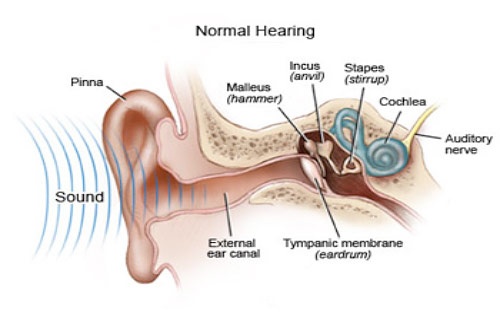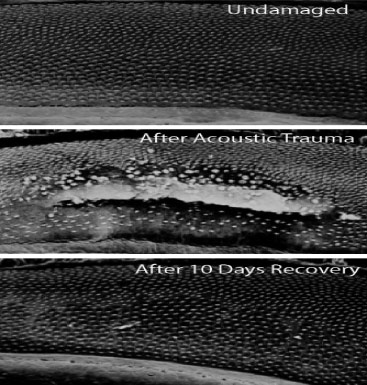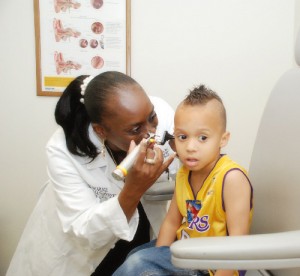- Acoustic Trauma: How Loud Noises Can Damage Hearing - February 26, 2013
Acoustic trauma is caused by loud noises, which damage the inner ear.
Normally, the brain process sound through a “domino” effect. Sound travels along a pathway from air to the brain and if any piece of the path is injured, for example due to a loud noise, hearing loss results.

In a normally working system, sound first is collected by the pinna, which is the cartilage portion of the ear that is visible on the outside. The sound waves then travel through the ear canal to the eardrum and cause it to vibrate. The vibrations are sent to three smaller bones (ossicles) within the ear called the malleus, incus, and stapes. These smaller bones send the vibrations to the cochlea (a snail shaped sac of fluid), causing tiny hair cells in the cochlea to bend. These hair cells are attached to nerves and when they bend, it produces an electrical signal which is carried to the brain. The brain recognizes these signals as sound.
When the vibrations sent to the inner ear are too strong it can damage the eardrum, ossicles, or cochlea.
What causes acoustic trauma?
- Loud explosions
- Gunshots
- Loud music
- Loud machinery (workplacenoise)
- Head trauma (i.e., hitting the side of the head)
What are the symptoms?
- Hearing loss – high pitches are more frequently lost but hearing loss can occur at any frequency
- Worsened hearing loss over time
- Tinnitus (ringing in the ear)
- Fullness in the ear
- Inability to localize sound
How can I treat acoustic trauma?
It is important to understand that the hearing loss may be irreversible and untreatable. The hearing loss may also need surgery or it may resolve on its own. The only way to know the difference is to seek medical advice. Even if the hearing loss is not reversible, treatment can protect further loss of hearing.
Medical consulation may indicate that:
- A rupture eardrum has occurred, which may require surgery
- A hearing aid may be used
- Aural rehabilitation may help, which allows patients to learn how to live and work with hearing loss
- Hearing loss is irreversible
Most importantly, seeking medical attention immediately gives the pateint the best chance of recovery. The best time to use medicaiton to reverse hearing loss is in teh first few days. After this, the options are significatly limted and hearing loss is likely irreverislbe at this point. Therefore, as soon as you notice hearing loss, it is critical to make an appointment with an ENT and explain your situation to ensure you are seen within the first few days. Steroids given during this window may return hearing to normal.

Hair cells before, during, and after injury. Note that they look almost normal, although there are fewer cells after injury.
How can I prevent acoustic trauma?
- Use of custom ear plugs or muffs when in a loud working environment, a shooting range, etc
- Use custom headphones when listening to music, which allows you to turn down the volume because there is less ambient noise
To learn more about ear issues or other procedures offered at the internationally renowned Osborne Head & Neck Institute, visit: http://www.ohni.org



